Education app trends aren't about what's changing, they're about what's shaping how we connect information with interest.
Today's education apps go far beyond basic PDFs or video lessons. They're becoming intelligent, engaging platforms that adapt to each learner's style, pace, and goals.
Gone are the days when online learning meant watching long movies and taking simple questions.
Now, apps offer personalized lessons, real-time progress tracking, AI-powered recommendations, and even AR/VR features that turn education into an entertaining experience.
The latest technology trends in education apps show us a future where students have 24/7 access to study help, engaging material, gamified motivation, and seamless learning, whether in a classroom or on the move.
Whether launching your first edtech startup or updating your institute's digital tools, keeping up with key educational app trends is non-negotiable.
This blog discusses the top trends in education app development that are changing how people learn, connect, and thrive.
What is an Education App?
An education app is more than just a digital guide, it's an intelligent, engaging platform created to make learning available anytime, anywhere.
Whether you plan to develop an education app for kids, college students, or professionals, the goal remains the same: to offer a seamless, powerful learning experience across mobile and web platforms.
From kids clicking through bright alphabet flashcards to professionals mastering machine learning on their journey, education apps cater to every stage and style of learning.
And what makes them so effective? It's the features.
Modern education apps include interactive questions, real-time progress tracking, video lectures, notes, live coaching, peer teamwork, and gamified modules.
Many even leverage AI-driven personalization, adapting material to each learner's pace, behavior, and goals.
The result? A learning experience that's tailor-made, immersive, and incredibly effective.
While many students rely on these apps for interactive learning, there are times when additional academic support is needed. For those moments, a trusted service to do your homework can provide personalized assistance to ensure that students stay on track, even when the learning curve gets steep.
As the demand for open, self-paced, and interesting learning continues to grow, so does the innovation behind educational platforms.
They're not just changing how we learn, they're revolutionizing education itself, making it more accessible, affordable, and exciting than ever before.
Market Statistics of Education Apps
The EdTech market is soaring, powered by surging demand for smart, tech‑driven learning solutions. Here’s where things stand:
-
The global EdTech market was valued at around $163.5 billion in 2024, expected to climb to $348.4 billion by 2030, growing at a ~13.3 % CAGR.
-
Over 65 % of students now prefer digital learning tools over traditional classroom methods.
-
Education apps featuring gamified content deliver up to 40% higher retention rates, making engagement truly measurable.
These numbers aren't just impressive, they're a clear sign of where education is headed and why staying on top of education app development trends is essential.
Top Trends in Education App Development
Let’s explore the most game-changing trends in education apps shaping the future of learning.
1. AI-Powered Personalization for Smarter Learning
Artificial Intelligence is changing how learners connect with content in education apps.
By studying user behavior, learning speed, and preferences, AI changes lessons in real time, creating a personalized learning journey for each student, regardless of age or goal.
With the help of cutting-edge mobile app development services, education apps are changing into intelligent, flexible platforms that go far beyond basic lesson plans.
Imagine getting into an app that quickly knows where you're suffering, offers personalized questions, changes content complexity, and cheers your wins with the right nudge.
That's AI at work, your pocket-sized teacher, always ready.
Here's how AI is changing the education experience:
-
Smart recommendations based on past performance.
-
Adaptive tests are developed with your learning level.
-
Real-time progress screens for students and parents.
-
Personalized study plans and notes.
-
Voice-assisted answers and coaching.
These features aren’t just high-tech; they’re highly effective.
As learners crave more freedom and personalized learning experiences, AI stands out as one of today's most powerful educational app trends.
It changes, guesses, and reacts to individual student needs in real-time. But here’s the real magic: it’s not just improving education; it’s humanizing it.
By combining smart algorithms and behavior-based content delivery, AI makes learning feel natural, responsive, and even sensitive.
Businesses are looking to AI development services in Dubai to power their next-gen education platforms.
They mix tech genius with global educational goals to build intelligent, flexible, and emotionally intelligent learning apps.
2. Augmented Reality (AR) for Interactive Learning
Why just read about volcanoes when you can watch one explode right in your living room?
That's the power of augmented reality (AR), which changes lecture ideas into 3D, hands-on experiences that spark interest.
AR adds digital content to the real world, changing idle learning into active discovery.
With a simple tap, students can analyze a human heart, walk through old towns, or picture difficult math problems, all through their smartphones or laptops.
Thanks to advanced AR/VR development services, education apps are now improving lessons with immersive elements that were once only possible in high-tech labs or field trips.
Here's how AR is revolutionizing digital learning:
-
Interactive science models and virtual studies.
-
3D models for history, biology, and geography.
-
Real-time notes and visible cues for better understanding.
-
AR notes that bring learning to life.
-
Virtual field trips to space, museums, or deep-sea ecosystems.
These experiences don't just boost interest; they improve knowledge.
AR stands tall as a game-changer among the latest technology trends in education app development. It's not just fun, it's the future of important, remembered learning.
3. Offline Mode for Uninterrupted Learning
Spotty internet? No problem. With offline mode, learning doesn't stop just because the Wi-Fi's acting up.
Offline access is one of the new trends in education apps that's making digital learning more open and reliable, especially for students in rural or poor areas.
Education apps can keep the pace going no matter the network situation by allowing users to download lessons, videos, tests, and even interactive modules in advance.
It's not just a backup; it's a tool that improves simplicity for learners on the move, whether working, flying, or simply handling limited data.
Here's how offline mode adds real value:
-
Downloadable course content for continuous study.
-
Seamless updating of progress once reconnected.
-
Ideal for online learning in rural or low-bandwidth zones.
-
Encourages open, self-paced learning anywhere, anytime.
In a world without guaranteed connection, offline access has become a must-have, not just a bonus.
It's useful and motivating, and it's a key part of building better, more accessible education apps in the future.
4. Virtual Reality (VR) for Immersive Classrooms
Virtual Reality (VR) takes learning beyond imagination by bringing students into the lesson.
Why just read about old Rome when you can walk through its streets?
Or study human anatomy when you can perform a virtual surgery step-by-step, without picking up a scalpel?
VR creates immersive, 360-degree worlds that allow learners to connect with content in new ways.
From visiting the pyramids to modeling high-stakes science labs, it offers realistic, hands-on experiences in a safe, controlled, and engaging environment.
Thanks to cutting-edge VR development services, education apps are now offering:
-
Virtual classes with live avatars.
-
Simulated lab activities without the mess or danger.
-
Immersive history trips and cultural studies.
-
Realistic skill training for areas like medicine or engineering.
This tech doesn't just teach, it changes how students experience learning.
Virtual Reality is leading the charge among next-gen education app trends, mixing immersive images with important interaction. It's not just cool, it's new.
As more businesses explore VR-powered learning apps, one hot question arises: What's the cost to build an educational app with such features?
Innovation requires investment, but the long-term effect on learners makes every dollar worth it.
5. Voice Search & Virtual Study Assistants
Hands-free learning is here to stay, making education apps better and more convenient.
With voice-enabled features and virtual assistants, learners no longer have to stop what they're doing to type or scroll.
Instead, they can simply say their questions, get quick recaps, or set study notes without moving a finger.
Voice technology is becoming a core part of the technological trends in education apps, providing a seamless, interactive experience that feels more natural and personal.
Whether you ask for definitions, hear explanations aloud, or control your study schedule, these tools make learning more accessible, especially for multitaskers or those with limited movement.
Here's why hands-free learning is a game-changer:
-
Instant answers and reports with voice commands.
-
Setting notes or alarms to keep you on track.
-
Virtual assistants that guide and inspire learners anytime.
-
Improved engagement for oral and speaking learners.
-
Freedom to learn while on the move or doing chores.
As education apps change, voice-enabled learning becomes a must-have feature, mixing speed with a personal touch.
6. Advanced Data Security & Privacy Protection
Data security isn't just a feature, it's the backbone of trust in education apps. With so many young learners involved, keeping their info safe is crucial.
That's why mobile app security is a top priority in school app development trends today. Strong security, role-based access, and compliance with data rules like GDPR are no longer negotiable; they're essential.
Encryption guards personal data so only authorized eyes can see it. Role-based access ensures teachers, students, and admins get the necessary rights. Nothing more.
And GDPR compliance? It's the global gold standard that gives users control over their data and builds lasting trust in your app.
Here's why top-tier security matters:
-
Protects kids' private info from breaches.
-
Builds trust with parents, teachers, and learners.
-
Meets foreign privacy laws effortlessly.
-
Creates a safe, effective learning setting.
As education apps improve, data security and privacy remain non-negotiable. It's not just about tech; it's about saving people.
In education, peace of mind is as important as progress.
7. Gamification in Education Apps
Gamification isn't just for games anymore, it's now a game-changer in education apps, boosting drive and learning retention like never before.
With leaderboards, badges, runs, and challenges, these interactive elements turn studying into a fun, satisfying journey that keeps students returning for more.
Regarding smart education app design, gaming taps into the human desire for achievement and social praise.
It makes learning feel less like a job and more like a game worth playing. Students set goals, track their progress, and celebrate milestones in ways that stick.
Here’s why AI in education is such a game-changer:
-
Increases student engagement through friendly competition.
-
Encourages regular study habits with streaks and prizes.
-
Builds community via leaderboards and group challenges.
-
Makes difficult topics easier to grasp with interactive tasks
As apps change, gaming is no longer a nice-to-have, it's an essential tool for effective learning. It changes education from a passive process into an exciting, motivating path.
In current digital classrooms, fun and learning aren't just buddies, they're a power couple driving success.
The benefits of education apps with gaming show that when education gets fun, engagement and results rise.
8. AI Chatbots for 24/7 Study Help
AI chatbots aren't just fancy tech; they're changing education apps by giving constant, personalized support that feels like having a study buddy on call 24/7.
These AI-powered tools support trainees by answering questions, breaking down advanced ideas, and being available 24/7.
AI chatbots tap into the need for ready, round-the-clock learning help by providing fast, personalized assistance.
This makes studying less isolated and more interactive, helping students stay on track and interested no matter where they are or what time it is.
Here’s why AI in education is such a game-changer:
-
Provide quick answers anytime, anywhere.
-
Personalize learning help based on user progress.
-
Reduce study stress with friendly, chatty help.
-
Keep teachers inspired with encouraging notes.
Thanks to advanced AI chatbot development, education apps are no longer optional; they're essential partners in the learning journey.
They make education more sensitive, helpful, and truly human. In the future of education, help is just a chat away.
Tips to Make Your Education App Future-Proof
The world of digital education is changing rapidly, and building an app that stays current requires more than great material.
It takes intelligence, flexibility, and a good understanding of new education app trends.
To develop a mobile app that stands the test of time, you need a plan that mixes innovation with user-centered design.
► Focus on Design Trends in Education Apps for Better UX
A sleek, simple UI can be a game-changer.
Embrace clean layouts, interesting visuals, and smooth movement that works for everyone, from kids tapping through lessons to adults taking upskilling programs.
Accessibility should also be a goal, ensuring all users enjoy an open learning experience.
► Stay Updated with Trends in Education Apps
The key to long-term success? Stay on top of the trending features in education app.
From gaming and AI-based learning to AR/VR experiences, new tools constantly change how learners interact with material.
Keeping an eye on these changes lets you constantly improve your app and meet users' needs.
► Integrate Emerging Technologies Like AR, VR & AI
Tech isn't just a trend, it's a competitive edge. You turn your platform into an engaging, intelligent tool by integrating AI, AR, or VR.
AI-powered chatbots and customization tools offer students quick help and customized learning paths.
To bring these ideas to life, it's important to hire mobile app developers who understand both education and innovation.
► Optimize for Multilingual and Inclusive Content
Reach more people by giving bilingual help and materials that respect ethnic differences.
Educational platforms that accept diversity build trust and grow worldwide, one lesson at a time.
► Ensure Scalability to Handle Growing Users Over Time
An education app should grow as your audience does, smoothly and without glitches.
Design your platform flexibly so it can handle more people, content, and features without slowing down.
This future-ready method helps you easily adapt to changing needs and confidently handle education app development challenges.
Why Choose JPLoft for Development Needs?
Looking for the best education app development company to build your education app? JPLoft is your go-to partner.
With over a decade of experience and 1,100+ successful projects, we specialize in building flexible, engaging, and safe education apps that are suited to your vision.
Our expert team combines the latest education app trends, AI tailoring, AR/VR, gaming, and strong security to offer top-notch learning experiences.
We focus on user-friendly design, smooth performance, and future-proof solutions that grow with your audience.
At JPLoft, we mix innovation with dependability to help you stand out in the competitive EdTech market.
Let's turn your teaching ideas into interactive, high-impact apps that inspire and educate people worldwide.
Wrapping Up
Success in EdTech isn't just about launching an app; it's about building a learning platform that provides real value.
Integrating AI-driven personalization and gaming allows you to build an education app that reacts to learners' needs and stays ahead of industry trends.
If you're ready to build something impactful, it's time to turn your idea into a smart, scalable education solution.
FAQs
Trends in education apps include AI-driven personalization, gamification, AR/VR-powered learning, offline accessibility, and voice-enabled virtual assistants. These technologies are transforming static content into interactive, student-focused learning experiences.
Common challenges include integrating interactive features like live classes, ensuring accessibility across devices, adapting content for various age groups, maintaining data security, and managing scalability as user volume increases.
AI can personalize learning paths, recommend performance-based content, provide instant feedback via chatbots, and automate assessments, making learning more efficient and tailored to individual needs.
Implement strong data encryption, secure user authentication, and comply with standards like GDPR and FERPA. Protect sensitive data such as student records, grades, and payment info using role-based access controls and secure cloud storage solutions.
Gamification, which uses badges, leaderboards, rewards, and challenges to add fun and motivation to the learning process, increases participation, encourages healthy competition, and makes learning feel like a game rather than a task.





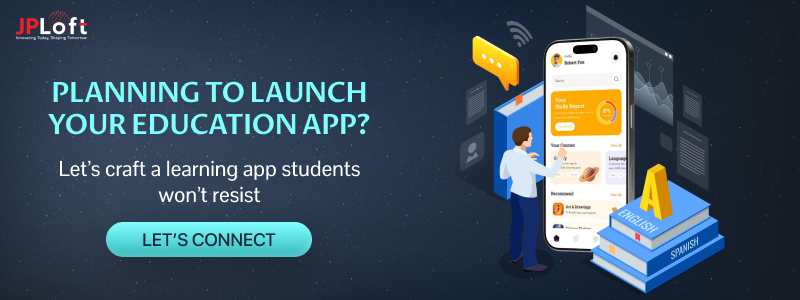
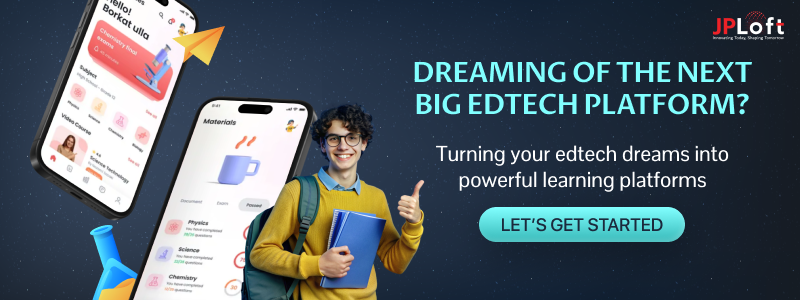
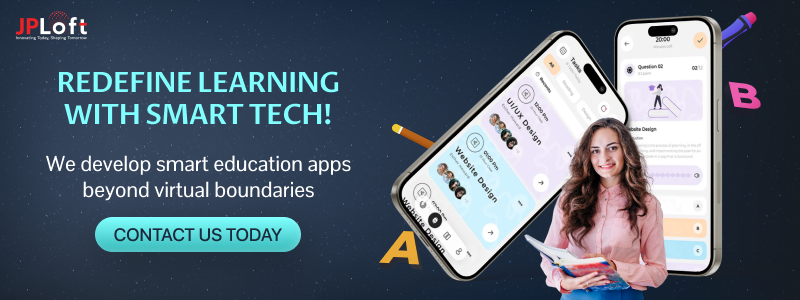


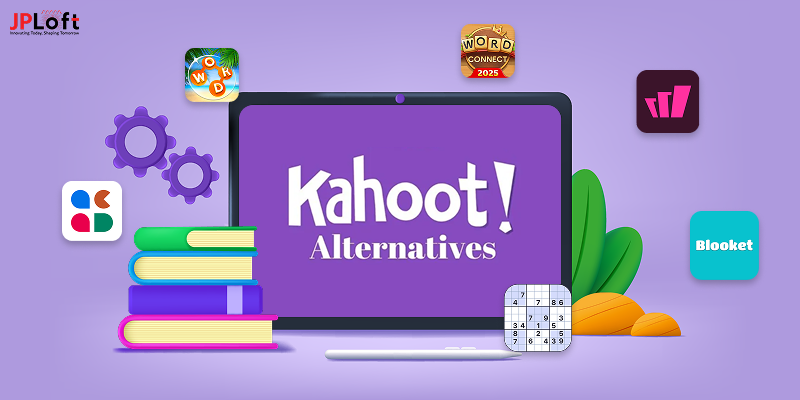
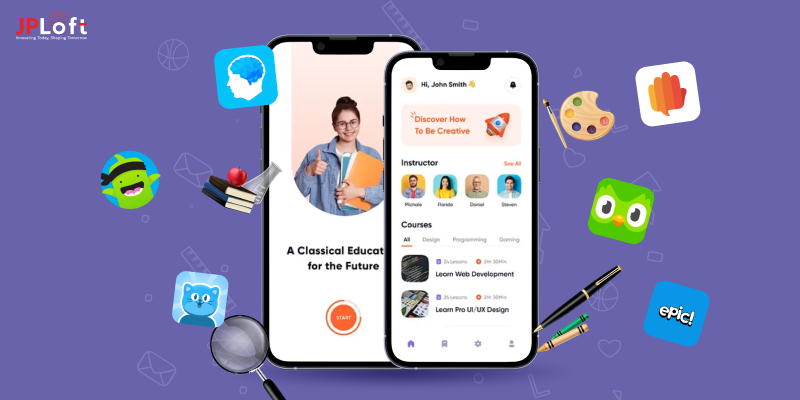


Share this blog